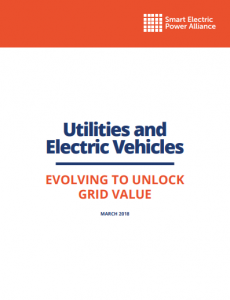Full Title: Utilities and Electric Vehicles
Author(s): Erika H. Myers, Medha Surampudy, and Anshul Saxena
Publisher(s): Smart Electric Power Alliance
Publication Date: March 1, 2018
Full Text: Download Resource
Description (excerpt):
Over the past several years, questions have arisen surrounding the role of electric utilities in the
growing electric vehicle (EV) market. As regulators make critical decisions in the coming years, they
should be mindful of the central role utilities will play to minimize the potential grid impacts of
this new load and increase access to important charging infrastructure.
Utilities have proven their ability to adapt and innovate to handle new challenges. For example, many utilities today have demand response programs that minimize system peaks caused by air conditioning on hot summer days or heating on cold winter nights. Similarly, we would anticipate utilities will respond to a large concentration of EVs that may be simultaneously charging on-peak.
However, that ability to innovate and respond to those conditions will take time and the ability to
test new strategies. Based on numerous and continuously revised EV forecasts, time is not on the utilities’ side. Forecasts increasingly predict exponential growth over a fairly narrow span of time. Many unknowns about the technology will also play a major role in EV planning; for example, which charging model—quick or longer duration charging—will ultimately prevail.
Further, many utilities do not want to just serve this new load—they want to take advantage of EVs as a distributed energy resource (DER) with the ability to modulate charge (i.e., managed charging), or even dispatch energy back into the grid (i.e., vehicle-to-grid). As noted throughout SEPA’s Beyond the Meter series, utilities need to understand and leverage distributed energy assets, including EVs, as grid assets to allow for greater penetration of renewable energy—among many other benefits.
